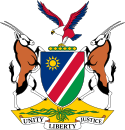The history of Namibia has passed through several distinct stages from being colonised in the late nineteenth century to Namibia's independence on 21 March 1990.

The South West Africa People's Organisation, officially known as the SWAPO Party of Namibia, is a political party and former independence movement in Namibia. Founded in 1960, it has been the governing party in Namibia since the country achieved independence in 1990. The party continues to be dominated in number and influence by the Ovambo ethnic group.

Samuel Shafiishuna Daniel Nujoma, is a Namibian revolutionary, anti-apartheid activist and politician who served three terms as the first President of Namibia, from 1990 to 2005. Nujoma was a founding member and the first president of the South West Africa People's Organization (SWAPO) in 1960. Prior to 1960, SWAPO was known as the Ovambo People's Organisation (OPO). He played an important role as leader of the national liberation movement in campaigning for Namibia's political independence from South African rule. He established the People's Liberation Army of Namibia (PLAN) in 1962 and launched a guerrilla war against the apartheid government of South Africa in August 1966 at Omungulugwombashe, beginning after the United Nations withdrew the mandate for South Africa to govern the territory. Nujoma led SWAPO during the lengthy Namibian War of Independence, which lasted from 1966 to 1989.
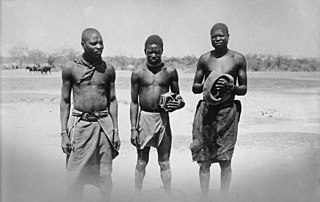
The Ovambo people, also called Aawambo, Ambo, Aawambo, or Ovawambo (Kwanyama) the biggest of the Aawambo sub-tribes are a Bantu ethnic group native to Southern Africa, primarily modern Namibia. They are the single largest ethnic group in Namibia, accounting for about half of the population and one of Namibia’s most vibrant tribes. They have retained many aspects of their cultural practices, despite concerted efforts from Christian missionaries to wipe out what was believed to be ‘pagan practices’. They are also found in southern Angolan province of Cunene where they are more commonly referred to as "Ambo". The Ovambo consist of a number of kindred Bantu ethnic tribes who inhabit what was formerly called Ovamboland. In Angola, they are a minority, accounting for about two percent of the total Angolan population.
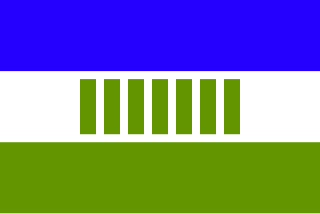
Ovamboland, also referred to as Owamboland, was a Bantustan in South West Africa, intended by the apartheid government to be a self-governing homeland for the Ovambo people.
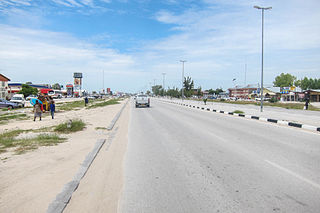
Ondangwa is a town of 23,000 inhabitants in the Oshana Region of northern Namibia, bordering Oshikoto Region. Ondangwa was first established as a mission station of the Finnish Missionary Society in 1890. In 1914 it became a local seat of government.
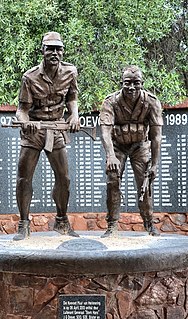
Koevoet was the counterinsurgency branch of the South West African Police (SWAPOL). Its formations included white South African police officers, usually seconded from the South African Security Branch or Special Task Force, and black volunteers from Ovamboland. Koevoet was patterned after the Selous Scouts, a multiracial Rhodesian military unit which specialised in counter-insurgency operations. Its title was an allusion to the metaphor of "prying" insurgents from the civilian population.
Herman Andimba Toivo ya Toivo was a Namibian anti-apartheid activist, politician and political prisoner. Ya Toivo was active in the pre-independence movement, and is one of the co-founders of the South West African People's Organisation (SWAPO) in 1960, and before that, its predecessor the Ovamboland People's Organization (OPO) in 1959.

The South African Border War, also known as the Namibian War of Independence, and sometimes denoted in South Africa as the Angolan Bush War, was a largely asymmetric conflict that occurred in Namibia, Zambia, and Angola from 26 August 1966 to 21 March 1990. It was fought between the South African Defence Force (SADF) and the People's Liberation Army of Namibia (PLAN), an armed wing of the South West African People's Organisation (SWAPO). The South African Border War resulted in some of the largest battles on the African continent since World War II and was closely intertwined with the Angolan Civil War.

The Diocese of Namibia is part of the Anglican Church of Southern Africa, which is itself part of the Anglican Communion. The diocese, which covers the whole country of Namibia, was originally known as the Diocese of Damaraland. Most of the Anglicans in Namibia live in Ovamboland in the north of the country and speak the Oshikwanyama language.
Peter Tanyangenge Kalangula was a Namibian political and religious leader. Bishop Kalangula had an interesting personal history which involved both politics and church.

The South West Africa National Union (SWANU) is a Namibian political party founded in 1959. Most of its members came from the Herero people, while fellow independence movement SWAPO was mostly an Ovambo party. The party's president is Charles Katjivirue.
The Ovamboland People's Organization (OPO) was a nationalist organization that existed between 1959 and 1960 in South West Africa. The aim of the organization was to end the South African colonial administration, and the placement of South West Africa under the United Nations Trusteeship system. Andimba Toivo ya Toivo had founded its predecessor, the Ovamboland People's Congress, in 1957 in Cape Town, South Africa. In 1959, Sam Nujoma and Jacob Kuhangua established the Ovamboland People's Organization (OPO) at the Old Location in Windhoek. Sam Nujoma was the president of OPO until its transformation into the South West Africa People's Organization (SWAPO) a year later and remained president until Namibia gained independence in 1990.
Andreas Zack Shipanga was a Namibian politician known for the "Shipanga Rebellion", a movement within SWAPO that sought to elect a new leadership and whose followers were in response detained without trial. Imprisoned for two years following this fall-out, Shipanga was arrested and held in detention in Zambia then Tanzania until 1978. After his release from prison he founded the opposing SWAPO Democrats and served as minister in different portfolios in the Transitional Government of National Unity, the interim government of South-West Africa directly before Namibian independence.
Samuel Abraham Peyavali "Peya" Mushelenga is a Namibian politician and poet. He is broadly educated, holding twelve academic qualifications from six different universities.

Coloured people in Namibia are people with both European and African, especially Khoisan and Bantu ancestry, as well as Indian, Malay, and Malagasy ancestry especially along the coast and areas bordering South Africa. Coloureds have immigrated to Namibia, been born in Namibia or returned to the country. These distinctively different periods of arrivals, from diverse backgrounds and origins have led to a diverse Coloured population. This diversity was even further exploited by South African officials who referred to three distinct groups amongst the coloureds, namely: "Baster", "Cape Coloureds" and "Namibian Coloureds".

The Finnish Evangelical Lutheran Mission is a Lutheran missionary society formed on January 19, 1859, in Helsinki, Finland. It is one of seven organisations of the Evangelical Lutheran Church of Finland (ELCF) that conduct missionary work. Its first deployments outside Finland were made to Ovamboland, an area that today is cut by the Angola-Namibian border.
Voice of Namibia (VoN) was a pirate radio station propagating Namibian independence, and the political mouthpiece of the South West African People's Organization (SWAPO) during the Namibian War of Independence. It operated from 1966 until Namibian independence in 1990 from different hosting stations in Sub-Saharan Africa.

Peter Hitjitevi Katjavivi is a Namibian politician who is the Speaker of the National Assembly of Namibia since March 2015 and the chancellor of the Namibia University of Science and Technology from 1992 to 2003. Previously he was the founding Vice-Chancellor of the University of Namibia from 1992 to 2003, Ambassador to the European Union from 2003 to 2006, Ambassador to Germany from 2006 to 2008, and Director General of the National Planning Commission from 2008 to 2010.
Rosemary Jane Tuauana Katjavivi was an English-born Namibian author, publisher and editor.
